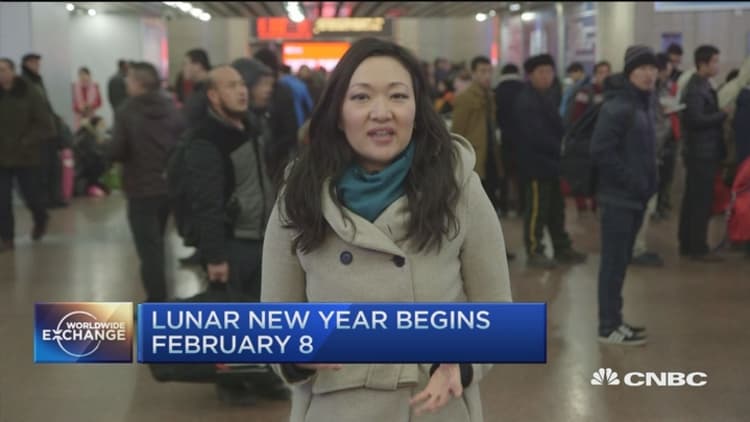There's long been friendly competition on the eve of the Chinese New Year, as children vie for the most red packets, or hongbao. Now, kids need gaming skills to snare more cash, as tech giants compete to snare the huge e-hongbao market.
WeChat, the mobile chat app owned by China's Tencent, revolutionized hongbao - the red packets, or envelopes, that senior family members stuff with "lucky money" and present to junior relatives - in 2014 when it introduced a digital money-transfer feature called e-hongbao.
Users can transfer cash from debit cards linked to their WeChat accounts to a number of digital red packets, or e-hongbao. The packets are sent via WeChat to recipients, who must press an "open" button to get the money. The amount of money in each red packet is generated randomly on a "first come, first served" basis.
"My friends, colleagues and even parents are all exchanging e-hongbao," said 24-year-old Zhenni Li. "Hongbao is no longer just given from the senior to junior family members."

It's all about who's the fastest on the button, and who's the luckiest. "It's more like an interactive game and a fun way to send greetings," Li told CNBC.
This year, even China's Communist Party joined the trend, handing out 300,000 yuan ($45,000) before the Chinese New Year's eve via e-hongbao.
E-hongbao rocket in popularity
The number of e-hongbao exchanges has ballooned in the two years since WeChat launched the feature.
According to China's official Xinhua New Agency, more than 5 million WeChat users sent e-hongbao during the first two days of 2014's new year holiday, exchanging over 20 million e-hongbao. This number jumped in 2015 to more than 1 billion e-hongbao exchanges made just on the New Year's eve.
According to data released on Tuesday by Tencent, the number of e-hongbao exchanges rocketed this year to 8 billion, with 420 million people making transfers on New Year's eve alone.
Tech giants wage e-hongbao war
As e-hongbao recipients compete to press "open" first, competition between the tech giants behind the digital red packets is also heating up.
During this Lunar New Year holiday period, Chinese internet companies were expected to give out to users e-hongbao, containing either cash or discount vouchers, worth more than 10 billion yuan ($1.5 billion), Xinhua reported.
One major rival to WeChat is Alipay, Alibaba's digital payment service, which has a user base of 400 million. Alipay replaced Tencent as the sponsor of this year's Spring Festival Gala, an event televised by Chinese state broadcaster CCTV that attracted about 700 million viewers on Sunday night. Alipay handed out red envelops worth 800 million yuan ($122 million) during the gala.
What's in it for the providers?
Both companies are keen to use e-hongbao to get access to users' bank accounts, in an effort to tap into China's rapidly growing mobile payment market.
"This is the future trend," 42-year-old Qinghong Chen told CNBC. "More and more shop owners prefer mobile payments. Even our community's butcher shop has launched the weekly Wechat or Alipay promotion."
Chen believes that the changing lifestyle of Chinese millennials will also help to fuel China's mobile payment market.
"My son likes to get money from me by mobile transfers because he doesn't like to carry cash," she said. "His lifestyle also encourages me to use more online or mobile payments."
The end of red paper packets?
Ding, who asked CNBC not to use his full name, has been operating a newspaper stand in Chengdu, China's southeastern Sichuan Province, for more than 10 years. This year, he saw a fall in the number of red paper packets purchased.
"In the last 10 days before the 2015 Chinese New Year, I sold about 30 paper red packets per day," said Ding. "This year, I only sold three or four per day."
Ding told CNBC that he believed the increasing popularity of e-hongbao and China's economic slowdown both contributed to the sluggish sales of paper packets.
Lin, who runs a community supermarket, and also asked CNBC not to use her full name, agreed.
"Buyers of paper red packets this year are mostly senior people who like to follow the traditional culture," she said. "Overall, sales in my store is down about 20-30 percent on year."
However, others argue that despite the growth in e-hongbao, traditional red packets are still the mainstream choice.
Ranging from 0.01 yuan to hundreds of yuan, WeChat's e-hongbao is more like sending greetings between friends through the social media app, while paper red packets usually carry cash worth from hundreds of yuan to thousands.
"I don't think e-hongbao will replace the traditional red packets," said Ying Li, 27. "My family is relatively conservative, so senior relatives will have to hand out physical paper red packets."
She received WeChat e-hongbao worth 1,559 yuan ($237) and red packets containing 5,500 yuan ($836) in cash. "I still like the old tradition," said Ying Li. "This is how I get most of my pocket money in a year."


